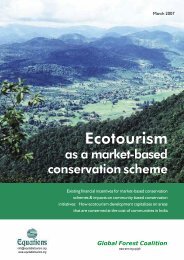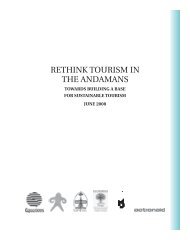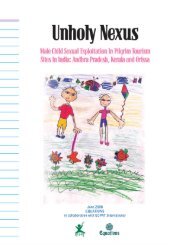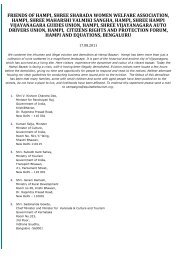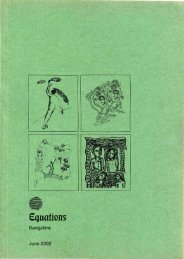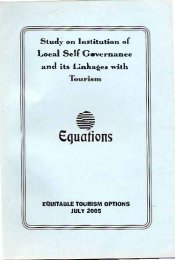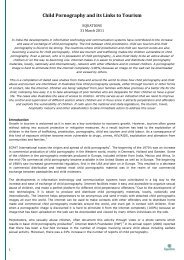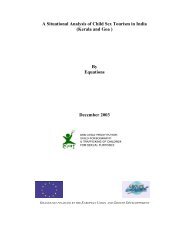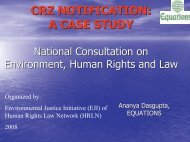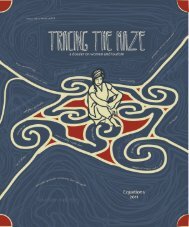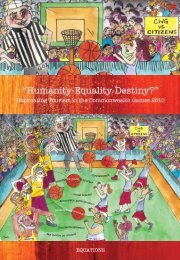Claiming the Right to Say No-30 Nov 09-EQUATIONS - Equitable ...
Claiming the Right to Say No-30 Nov 09-EQUATIONS - Equitable ...
Claiming the Right to Say No-30 Nov 09-EQUATIONS - Equitable ...
You also want an ePaper? Increase the reach of your titles
YUMPU automatically turns print PDFs into web optimized ePapers that Google loves.
<strong>Claiming</strong> <strong>the</strong> <strong>Right</strong> <strong>to</strong> <strong>Say</strong> <strong>No</strong><br />
narrative construction provides space that allows a person ei<strong>the</strong>r <strong>to</strong> follow<br />
his/her basic orientation in life or seek temporary freedom from <strong>the</strong> chains<br />
of daily routine of life. Thus, <strong>the</strong> <strong>to</strong>urists might affirm <strong>the</strong>ir selves or might<br />
just allow <strong>the</strong>mselves <strong>to</strong> glide <strong>the</strong> slope only for <strong>the</strong> period of holiday<br />
(short biographical transition). Hence, some scholars argue that <strong>to</strong>urism<br />
is a form of leisure imperialism.<br />
Narrative Creation of <strong>the</strong> Hosts<br />
The narrative provides us <strong>the</strong>matic unity of life that gives us a sense of<br />
direction. They are important and even inescapable means of selfrepresentations<br />
that create and sustain our identity. Our narratives shape<br />
what we value, aspire, respect, care about, admire and identify with. This<br />
means narratives provide context for a dialogical construction of our<br />
identities. Our life matter <strong>to</strong> us and narratives belong <strong>to</strong> <strong>the</strong> space of<br />
‘mattering’ or concern that we can refer <strong>to</strong> as unity of a life. My life as an<br />
object of my concern has a narrative unity which Taylor says is a <strong>the</strong>matic<br />
unity not mere sameness of <strong>the</strong> human organism. That is, we tend <strong>to</strong> make<br />
sense of our life as a s<strong>to</strong>ry which provides us a life-plot that is oriented by<br />
<strong>the</strong> standards of excellence rooted in <strong>the</strong> centres of narrative gravity.<br />
This means we are inclined <strong>to</strong> make sense of our life as an unfolding s<strong>to</strong>ry<br />
in a way that gives meaning <strong>to</strong> our past and direction <strong>to</strong> our future. Thus,<br />
we have <strong>the</strong> centres of narratives gravity that provides us ‘moral space’<br />
or direction in life. Moving <strong>to</strong>wards or away from <strong>the</strong>se standards of<br />
excellence is an inescapable feature of self-hood. Therefore, when <strong>to</strong>urism<br />
becomes part of <strong>the</strong> <strong>the</strong>matic unity of life, it shapes particular sites and<br />
guides how activities become scripted in certain locations.<br />
One can notice that <strong>to</strong>urist activities almost everywhere invade cultures<br />
that are largely coherent and closed meaning systems and introduce<br />
consumerist values, altering local priorities and converting <strong>the</strong> local cus<strong>to</strong>ms<br />
and mores in<strong>to</strong> commodities <strong>to</strong> be preyed upon by <strong>the</strong> visi<strong>to</strong>rs. The<br />
infrastructure built for <strong>to</strong>urism such as resorts, hotels, shopping malls, fast<br />
food outlets produce standardized experiences for consumers reducing<br />
<strong>the</strong> locals <strong>to</strong> servants. Tourism is thus associated with what Ritzer calls<br />
4



